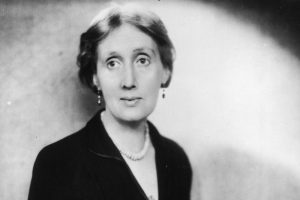Colin Dickey in The New Republic:
 Every so often a book comes along and changes the way you see a classic of literature. The Diary of Virginia Woolf, published between 1977 and 1984, came out decades after Woolf’s death in 1941, and added a stunning lens through which to view her long and dynamic career. Her husband Leonard had carefully edited a volume initially in 1953, one that focused entirely on Woolf’s writing process and avoided personal details, but it was only when Woolf’s diaries were released in their totality that readers gained a precious glimpse inside a complicated mind at work.
Every so often a book comes along and changes the way you see a classic of literature. The Diary of Virginia Woolf, published between 1977 and 1984, came out decades after Woolf’s death in 1941, and added a stunning lens through which to view her long and dynamic career. Her husband Leonard had carefully edited a volume initially in 1953, one that focused entirely on Woolf’s writing process and avoided personal details, but it was only when Woolf’s diaries were released in their totality that readers gained a precious glimpse inside a complicated mind at work.
They revealed a Woolf unexpectedly playful and at times mundane: “So now I have assembled my facts,” she wrote on August 22, 1922, “to which I now add my spending 10/6 on photographs, which we developed in my dress cupboard last night; & they are all failures. Compliments, clothes, building, photography—it is for these reasons that I cannot write Mrs Dalloway.” They also reveal a Woolf at times both vicious and shitty: her cattiness, her casual racism. Ruth Gruber, who wrote the first PhD dissertation on Woolf, had a short, pleasant correspondence with her in the 1930s, only to discover, when the diaries were later published, Woolf referring to her dismissively as a “German Jewess” (Gruber was born in Brooklyn). As Gruber would write of the experience, “Diaries can rip the masks from their creators.”
Unlike many writers’ diaries, The Diary of Virginia Woolf has become more than just a gloss on her novels; it is a work of literature in and of itself, a powerful and startling look into the inner life of a woman writer during a dramatic time. “I will not be ‘famous,’ ‘great,’” she wrote in 1933. “I will go on adventuring, changing, opening my mind and my eyes, refusing to be stamped and stereotyped. The thing is to free one’s self: to let it find its dimensions, not be impeded.” Woolf began writing in a diary in 1897, when she was just 14 years old; she would continue on and off again, for the rest of her life; she would write the final entry four days before her death in March 1941. In total, she wrote over 770,000 words in her diaries alone.
More here.
